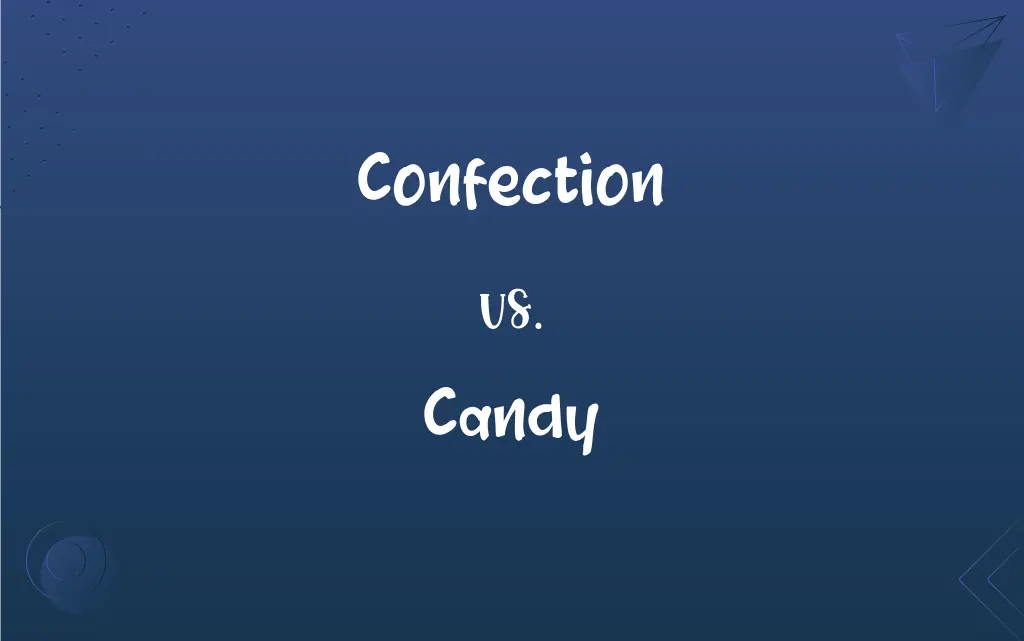Confection vs. Candy: What's the Difference?
Edited by Harlon Moss || By Janet White || Updated on September 27, 2023
Confection refers to a dish or item made with sweet ingredients, often decorated, while candy is a sweet food item, typically smaller and less complex.

Key Differences
Confection is a term that encompasses a wide range of sweet items, often consisting of sugar, chocolate, or fruit, and sometimes decorated. It can include pastries, cakes, and similar sweet preparations. Candy, in contrast, usually refers to smaller, simpler sweet food items like lollipops or chocolate bars, which are often commercially produced and packaged.
In the culinary world, confection denotes sweet items that are typically more complex and may involve several ingredients and preparation steps. It is a broader term, potentially including anything sweet and delightful made in the kitchen. Candy, however, is more straightforward, primarily focusing on simple and direct sweetness, often comprising one or two main flavors or ingredients, such as sugar and flavoring.
When discussing variety and assortment, confections offer a broader spectrum of sweet delights, including baked and unbaked goods, each with its unique recipe and presentation. Candies have a narrower scope, typically being small, individually wrapped sweet treats that are easy to consume and are portable.
The term confection can be synonymous with craftsmanship in the realm of sweets, reflecting the art and skill involved in creating diverse sweet creations. On the other hand, candy typically doesn’t imply a high level of culinary skill or artistry, being more about delivering sweetness in a convenient form.
Comparison Chart
Definition
A sweet dish or item, often complex
A sweet food item, usually simple
ADVERTISEMENT
Complexity
Generally more complex
Generally simpler
Variety
Broad range of items
Narrower range of items
Culinary Artistry
Higher level of craftsmanship
Less emphasis on craftsmanship
Commercial Availability
Available in bakeries or homemade
Typically commercially produced and packaged
Confection and Candy Definitions
Confection
A sweet food item, often elaborate.
The chef’s confection won the baking competition.
ADVERTISEMENT
Candy
A small, commercially produced sweet item.
The candy bar was filled with nougat and almonds.
Confection
A dish or delicacy made with sugar.
The strawberry confection was a hit at the party.
Candy
A simple sweet treat, often flavored.
The child was happy with a piece of candy.
Confection
A creation involving culinary artistry with sweet ingredients.
The chocolate confection melted in my mouth, revealing layers of flavor.
Candy
A sweet, flavored confection, usually small in size.
The bowl was filled with colorful candy.
Confection
A product of combining various ingredients to make a sweet dish.
The confection comprised chocolate, nuts, and caramel.
Candy
A rich sweet confection made with sugar and often flavored or combined with fruits or nuts.
Confection
The act or process of confecting or the result of it
"These sentiments are not the confection of a consummate courtroom actor" (Ron Rosenbaum).
Candy
A piece of such a confection.
Confection
A sweet prepared food, such as candy or cake.
Candy
(Slang) An illicit drug, especially one, such as cocaine, that has a sugary appearance or a drug in pill form, such as MDMA.
Confection
A sweetened medicinal compound; an electuary.
Candy
To cook, preserve, saturate, or coat with sugar or syrup
Candy apples.
Candy ginger.
Confection
A piece displaying splendid craft, skill, and work
The gown was a confection of satin and appliqué.
Candy
Edible, sweet-tasting confectionery containing sugar, or sometimes artificial sweeteners, and often flavored with fruit, chocolate, nuts, herbs and spices, or artificial flavors.
Confection
To make into a confection.
Candy
A piece of confectionery of this kind.
Confection
A food item prepared very sweet, frequently decorated in fine detail, and often preserved with sugar, such as a candy, sweetmeat, fruit preserve, pastry, or cake.
The table was covered with all sorts of tempting confections.
Candy
Crack cocaine.
Confection
The act or process of confecting; the process of making, compounding, or preparing something.
Candy
(uncountable) An accessory (bracelet, etc.) made from pony beads, associated with the rave scene.
Candy kid; candy raver
Confection
The result of such a process; something made up or confected; a concoction.
The defense attorney maintained that the charges were a confection of the local police.
Candy
(obsolete) A unit of mass used in southern India, equal to twenty maunds, roughly equal to 500 pounds avoirdupois but varying locally.
Confection
(dated) An artistic, musical, or literary work taken as frivolous, amusing, or contrived; a composition of a light nature.
Candy
(cooking) To cook in, or coat with, sugar syrup.
Confection
(dated) Something, such as a garment or a decoration, that is very elaborate, delicate, or luxurious, usually also impractical or non-utilitarian.
Candy
(intransitive) To have sugar crystals form in or on.
Fruits preserved in sugar candy after a time.
Confection
(pharmacology) A preparation of medicine sweetened with sugar, honey, syrup, or the like; an electuary.
Candy
(intransitive) To be formed into candy; to solidify in a candylike form or mass.
Confection
To make into a confection, prepare as a confection.
Candy
To conserve or boil in sugar; as, to candy fruits; to candy ginger.
Confection
A composition of different materials.
A new confection of mold.
Candy
To make sugar crystals of or in; to form into a mass resembling candy; as, to candy sirup.
Confection
A preparation of fruits or roots, etc., with sugar; a sweetmeat.
Certain confections . . . are like to candied conserves, and are made of sugar and lemons.
Candy
To incrust with sugar or with candy, or with that which resembles sugar or candy.
Those frosts that winter bringsWhich candy every green.
Confection
A composition of drugs.
Candy
To have sugar crystals form in or on; as, fruits preserved in sugar candy after a time.
Confection
A soft solid made by incorporating a medicinal substance or substances with sugar, sirup, or honey.
Candy
To be formed into candy; to solidify in a candylike form or mass.
Confection
A food rich in sugar
Candy
Any sweet, more or less solid article of confectionery, especially those prepared in small bite-sized pieces or small bars, having a wide variety of shapes, consistencies, and flavors, and manufactured in a variety of ways. It is often flavored or colored, or covered with chocolate, and sometimes contains fruit, nuts, etc.; it is often made by boiling sugar or molasses to the desired consistency, and than crystallizing, molding, or working in the required shape. Other types may consist primarily of chocolate or a sweetened gelatin. The term may be applied to a single piece of such confection or to the substance of which it is composed.
Confection
The act of creating something (a medicine or drink or soup etc.) by compounding or mixing a variety of components
Candy
Cocaine.
Confection
Make into a confection;
This medicine is home-confected
Candy
A weight, at Madras 500 pounds, at Bombay 560 pounds.
Confection
An intricately decorated sweet item.
The wedding confection was adorned with edible flowers.
Candy
A rich sweet made of flavored sugar and often combined with fruit or nuts
Candy
Coat with something sweet, such as a hard sugar glaze
Candy
A confection made primarily of sugar.
Hard candy is a popular choice for long trips.
Candy
An edible item, typically sweetened with sugar or syrup.
The candy store offers a variety of gummies.
FAQs
Does confection always refer to a complex sweet item?
While confections are often elaborate, the term can refer to any sweet dish or item.
Is candy always commercially produced?
While many candies are commercially produced, homemade candies also exist.
Can candy include chocolate?
Yes, chocolate can be categorized as a type of candy.
Is confection synonymous with dessert?
While many confections are desserts, not all desserts are confections, as some are not sweet.
Can confection refer to a savory item?
Confection typically refers to sweet items, but the term is sometimes used loosely for savory dishes with sweet elements.
Are all confections edible?
Typically, yes, confections are created to be edible sweet creations.
Are candies always small in size?
Candies are typically small, but some, like large chocolate bars, can be larger.
Can confection refer to a culinary creation with fruit?
Yes, confections can include fruit-based sweet items like preserves or fruit tarts.
Can a candy be a confection?
Yes, candy is a type of confection, typically simpler and smaller.
Does the term confection imply a high level of culinary skill?
Confections often involve culinary artistry, but the level of skill required can vary.
Can the term candy refer to a liquid?
While candy is typically solid, some liquid sweet items like syrups may colloquially be referred to as candy.
Can the term confection encompass candy-making artistry?
Absolutely, the artistry in creating candies can indeed be considered a part of confectionery.
Is candy limited to items containing sugar?
Candy usually contains sugar or sweeteners but can include other ingredients for flavor and texture.
Is candy more about flavor than presentation?
Generally, candy emphasizes flavor and sweetness, but some candies also focus on presentation.
Can confection include baked goods?
Yes, baked goods like pastries and cakes can be considered confections.
About Author
Written by
Janet WhiteJanet White has been an esteemed writer and blogger for Difference Wiki. Holding a Master's degree in Science and Medical Journalism from the prestigious Boston University, she has consistently demonstrated her expertise and passion for her field. When she's not immersed in her work, Janet relishes her time exercising, delving into a good book, and cherishing moments with friends and family.
Edited by
Harlon MossHarlon is a seasoned quality moderator and accomplished content writer for Difference Wiki. An alumnus of the prestigious University of California, he earned his degree in Computer Science. Leveraging his academic background, Harlon brings a meticulous and informed perspective to his work, ensuring content accuracy and excellence.































































